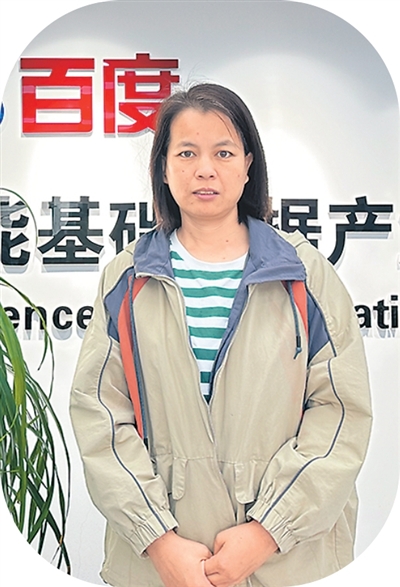Training AI to better understand humans
China is developing a new profession of artificial intelligence trainers who teach algorithms to understand human language, emotions and thought patterns, as the country seeks to make AI technology more human-centered.
Former mining employee becomes data annotator
Guo Mei is a 38-year-old data annotator at the data labeling base of Chinese tech giant Baidu in north China's Shanxi Province. She previously worked for a mining company.

Photo shows Guo Mei, a data annotator at a data labeling base of Chinese tech giant Baidu in north China's Shanxi Province. (People's Daily Overseas Edition/Yang Junfeng)
In September 2018, Baidu signed an agreement with the Shanxi Transformation and Comprehensive Reform Demonstration Zone to establish the data labeling base. By chance, Guo joined the base and stepped into the frontier of AI development.
Guo received systematic training in data labeling for autonomous driving, image classification and speech recognition before moving on to work with large language models. Her productivity surged from processing 200-300 images daily to more than 1,300, eventually earning her a promotion to team leader.
Guo's most memorable project involved facial recognition technology. "This work connects to Baidu's missing persons search program," she said. "Every data point we mark matters to society."
Baidu's missing persons search program was launched in 2016. Users can upload photos of missing relatives, which the system compares with records of missing persons maintained by the Ministry of Civil Affairs.
As a mother herself, Guo could empathize with families devastated by the loss of a child. "With every extra point we label, and with every 0.1 percent increase in accuracy, there's a chance a family might be reunited sooner," she said.
Baidu employs more than 10,000 AI trainers and has trained over 150,000 data annotators. The company has expanded its training programs to multiple provinces and cities, creating AI job opportunities.
Farmers become AI trainers
Every Monday morning, 46-year-old Wang Meimei walks into an office building in Yijun county, Tongchuan city, northwest China's Shaanxi Province. Once a farmer, she is now a certified AI trainer.
Wang farmed her family's 2-hectare plot until 2021. When she learned a local tech company was hiring workers with basic computer skills, she nervously applied for an interview.

Photo shows Wang Meimei, a former farmer and AI trainer at Aidou Technology Co., Ltd. in Yijun county, Tongchuan city, northwest China's Shaanxi Province. (Photo courtesy of the interviewee)
The company, Aidou Technology Co., Ltd., is a data labeling firm brought in by the local government to help boost the rural economy.
"We deliberately reduced entry requirements to give rural women access to the new profession," said company executive Zhang Rui.
Data annotation involves labeling images, text and audio to help AI systems recognize patterns and features of the data. In early 2020, data annotators were officially included on the national occupational classification list as one of the recognized roles of an AI trainer.
Many of Wang's colleagues previously balanced farm work with odd jobs. Many couldn't even use a computer mouse before beginning their training to teach machines.
"The company trains us regularly," Wang explained. "As AI advances so quickly, the standards for accuracy get stricter. We have to pass exams with zero mistakes before we can start working."
Aidou Technology Co., Ltd. has completed over 607,000 data annotation tasks worth more than 35 million yuan ($4.91 million). It employs over 240 people, with more than 70 percent being women from local rural areas.
Wang now earns 4,000 yuan monthly. She takes particular pride in helping AI identify corn diseases, using her new technical skills to solve problems she once faced in the fields.
Doctor becomes AI trainer to improve medical services
In Hefei, east China's Anhui Province, Hu Pingping checks medical data at a lab of Xunfei Healthcare Technology Co., Ltd. As an AI medical researcher, her mission is to help build a "medical brain" for AI, one that not only stores professional knowledge but also learns to think like a doctor.
Four years ago, Hu made the leap from a doctor in the gastroenterology department of a hospital to AI trainer.

Photo shows Hu Pingping, an AI medical researcher at Xunfei Healthcare Technology Co., Ltd. in Hefei, east China's Anhui Province. (People's Daily Overseas Edition/Yang Junfeng)
"The change came from something I kept noticing in my clinical work. Medical knowledge is expanding at an explosive rate. No doctor can possibly keep up with all the latest research and case studies. Meanwhile, grassroots clinics are in urgent need of high-quality medical resources," she said.
"I began to wonder: Could there be a way to bridge this gap — capturing the latest medical insights in a form that's always available, a tireless assistant that could empower frontline medical workers?"
In 2021, Hu left clinical practice for technology, determined to bring her medical expertise to AI systems and serve public health.
"The primary task of my team is to merge AI large language models with medical knowledge. We train medical AI assistants that can understand clinical language, help doctors retrieve information, analyze diagnostic reasoning and even support medical education," Hu said.
Photos
Related Stories
- AI-powered hearing aids bring clearer sound to China's elderly
- Guangxi's digital economy surges with AI driving growth: white paper
- China, ASEAN nations connect AI needs with solutions at summit in Nanning, S China's Guangxi
- Full text: AI+ International Cooperation Initiative
- China proposes AI+ Int'l Cooperation Initiative to benefit all
Copyright © 2025 People's Daily Online. All Rights Reserved.









